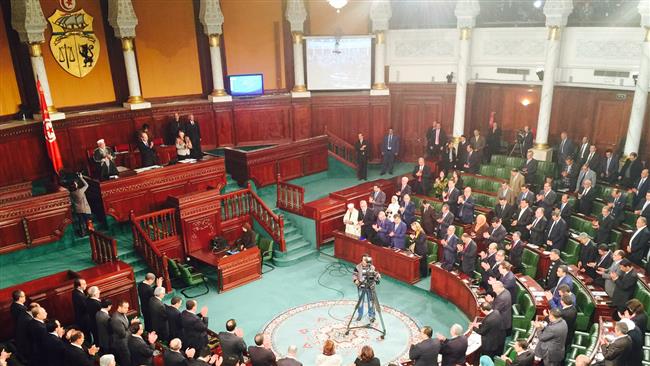Alwaght- On January 5, Essid was tasked with forming a new government by President Beji Caid Essebsi, who won Tunisia's first free presidential election in December since independence from France in 1956. Habib Essid is now Tunisia’s new Prime Minister. His government, including secularists, Islamists, and smaller parties, has gained the confidence of 166 lawmakers out of 217 members of the parliament.
Four years after the Islamic Awakening aroused in Tunisia with the uprising against Western-backed autocrat Zine El-Abidine Ben Ali, Tunisia is forming its first coalition government, including secular and Islamist parties, after the political transition with new constitution and free elections.
The coalition government, which includes ministers from the premier’s secular Nidaa Tounes party and the Islamic party, Ennahda, was approved by lawmakers on Thursday with 166 votes in favor, 30 against and eight abstentions.
Nidaa Tounes member Slim Chaker was named finance minister, and Taib Baccouche, also from Nidaa Tounes, will be foreign minister. Ennahda was given employment ministry and several other junior minister posts.
Essid's new government will have to push through tough economic reforms demanded by Tunisia's international lenders and continue a campaign against terrorist Takfiri militants. Tunisia is also a major source of Takfiri fighters traveling to Syria
"Our priority will be to strengthen measures to combat extremism and strengthen security capabilities to confront terrorism and the protection of the democratic transition," Essid said in parliament. In the 217-seat parliament, Nidaa Tounes holds 86 seats and its ally, the liberal, secular UPL party has 16 seats. Ennahda holds 69 seats, the Popular Front 15 and Afek Tounes eight.
With its political transition complete, Tunisia's new government must tackle high public spending and politically sensitive reforms to subsidies. Jobs, high living costs and economic opportunities are the main worry for most Tunisians.
"We need to start immediately economic reforms including rationalization of subsidies, review of the tax system, reform of the banking sector and cutting public spending," Essid said.
Tunisian Prime Minister Habib Essid has previously presented the new coalition government with a cabinet led by members from his secular Nidaa Tounes party, but also comprising some figures from the Islamic party, Ennahda, which led the previous government. The cabinet also included members from Afek Tounes and the Free Patriotic Union.
The premier's earlier attempt to form a government, consisting of just his own Nidaa Tounes and one other party was scrapped following speculations that he would lose the vote.
“We have made changes ... to widen the composition of the government with the participation of other political parties,” Essid said in the capital, Tunis, on Monday.
On Sunday, Ennahda gave its consent to join the vying secular party, Nidaa Tounes, in a coalition government aiming to bolster stability in the country.
Ennahda leader Rashed Ghannouchi made the announcement following a meeting with Essid, adding, “Ennahda will participate in the government.... The future looks good.”
Parliament speaker Mohamed Ennaceur said that the country could witness a period of stability if authorities listen to the Tunisian people.
The Ennahda party, which has the second largest number of seats in the assembly, had sought a unity government with Nidaa Tounes. However, the seculars initially made it clear that they were against any alliance with the Islamists.
Essebsi, from Nidaa Tounes, garnered 55.68 percent of the votes to overcome former president, Moncef Marzouki, who collected 44.32 percent of the ballots, in the run-off of December 21, 2014.
Over 1.3 million people voted for the secular Nidaa Touness party and its candidate, President Béji Caied Essebsi in both legislative elections and presidential race. However, many are now calling for anti-government protests.
51 MPs have not given confidence to the Cabinet of Habib Essid. They blame the Premier for appointing former regime figures to government positions including the Interior Ministry.
On Friday, Mehdi Jomaa will hand over power to Habib Essid. Later, the new Cabinet will take the oath of office in front of President Beji Caied Essebssi. 4 years after the 2011 popular uprising, new authorities are in power. Analysts say the presence of a strong opposition could destabilize the government before the end of the 5 year mandate.
Activists Reject any Normalization of ties with Israel
11 political parties and associations have rejected the new government that Tunisia's Prime Minister presented to the parliament. Politicians slammed the participation of some figures in the new cabinet who made several visits to Tel Aviv prior to the 2011 revolution.
Over the past 4 years, thousands of students and unemployed graduates have joined the anti-Zionism movement to demand a ban on relations with Israel.
The Tunisian civil society supports the axes of resistance against Israel. Activists call for unity among Muslims.
Analysts argue that the condemnation of Israel's crimes and atrocities is a shared responsibility on the shoulders of Muslims and all the free people throughout the world.
Activists say they will escalate their protests against Israel in order to put pressure on the parliament and the government to try any citizen who normalizes ties with the Tel Aviv regime.



























